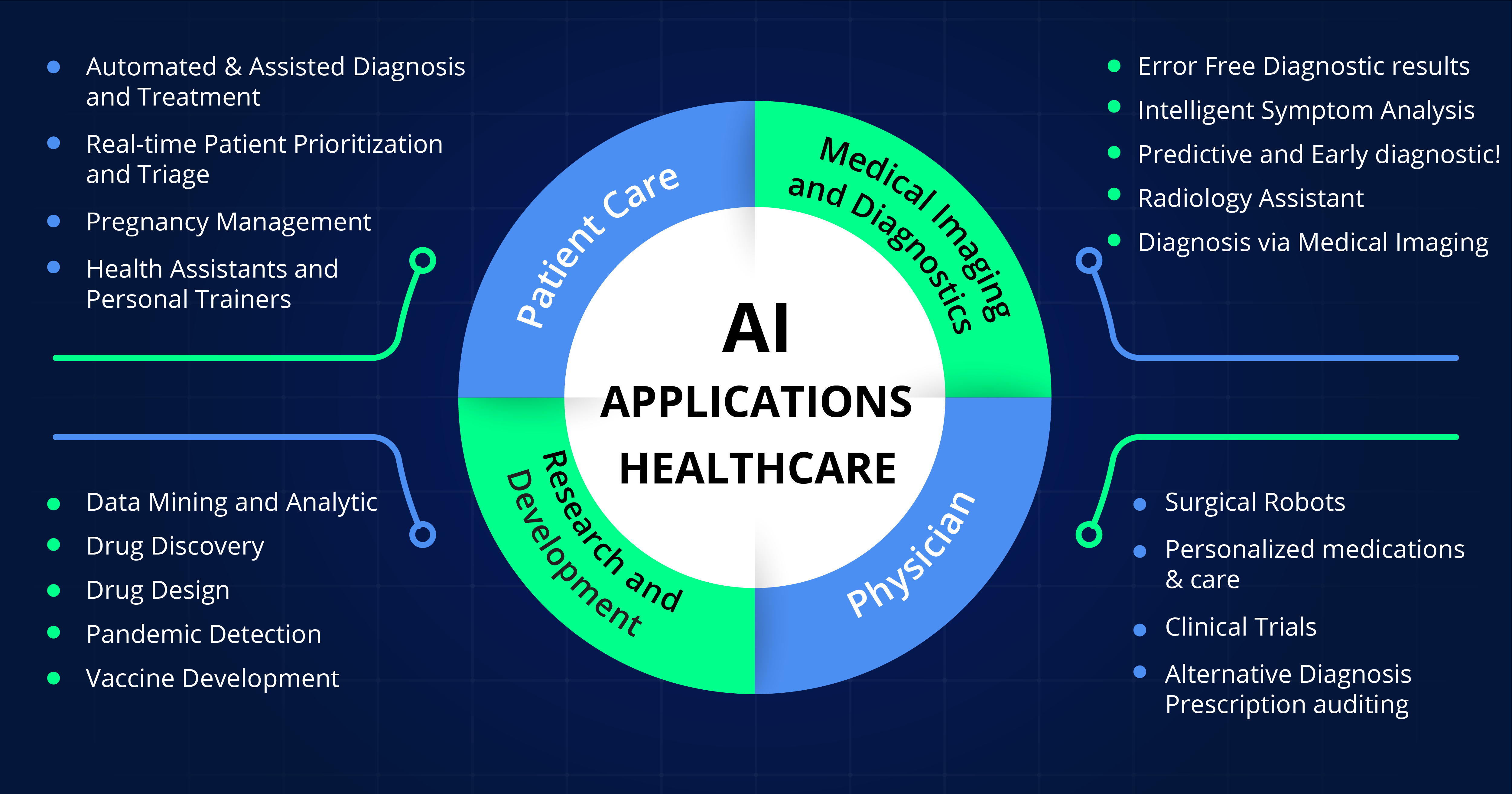Applications of Artificial Intelligence in Healthcare
Artificial Intelligence (AI) is no longer a futuristic concept; it’s actively transforming industries, especially healthcare. From improving diagnostics to streamlining administrative tasks, AI applications in healthcare are reshaping how care is delivered, making it more precise, efficient, and patient-focused. Let’s dive into how AI is revolutionizing healthcare, the real-world applications, and what this means for the future of medicine.

Figure: AI is paving the way for a smarter, more effective healthcare ecosystem.
Introduction to AI in Healthcare
Healthcare faces ongoing challenges, including rising costs, staff shortages, and the complexity of managing patient care. AI in healthcare offers solutions by harnessing the power of algorithms and big data to improve decision-making, reduce inefficiencies, and enhance patient outcomes. AI’s ability to process and analyze massive datasets enables healthcare providers to detect patterns that human clinicians might miss, ensuring timely and accurate diagnoses.
At DUYTHIN.DIGITAL, where we specialize in automation tools for platforms like Facebook and Google SEO, we understand the importance of leveraging technology to streamline processes—an approach that’s mirrored in how AI is redefining healthcare workflows.
“The power of AI lies not just in what it can do today, but in how it evolves to meet tomorrow’s challenges.” – Industry Expert
Medical Diagnosis: Transforming Accuracy and Speed
One of the most impactful applications of AI in healthcare is in medical diagnosis. AI systems analyze medical imaging data, such as X-rays, MRIs, and CT scans, with remarkable precision. For example, AI tools can detect early-stage breast cancer in mammograms, often identifying patterns invisible to the human eye.
Key Benefits of AI in Medical Diagnosis:
- Accuracy: AI reduces the margin of error in diagnoses, offering life-saving precision.
- Efficiency: Automated processes allow faster diagnostics, reducing patient waiting times.
- Scalability: AI supports overburdened healthcare systems by handling large volumes of data.

External Resource: Learn how AI algorithms are improving diagnostic accuracy.
For instance, IBM Watson Health leverages AI to aid oncologists in diagnosing cancer, significantly speeding up the process and offering treatment recommendations tailored to the patient.
AI-driven diagnostics are estimated to reduce misdiagnoses by 25%, saving countless lives.
Personalized Medicine: A Tailored Approach to Healthcare
Gone are the days of one-size-fits-all treatment plans. With AI-powered personalized medicine, treatments are customized to an individual’s genetic profile, medical history, and lifestyle. This approach ensures higher effectiveness and minimizes side effects.

Examples of Personalized AI Tools:
- Genomic Analysis: AI analyzes genetic data to predict disease risks and recommend targeted treatments.
- Behavioral Insights: AI tracks patient habits via wearables, creating actionable insights for lifestyle adjustments.
For example, companies like Tempus use AI to analyze genetic information and recommend precise cancer treatments. This not only boosts survival rates but also enhances patient comfort during therapy.
Internal Resource: For insights into automating complex data analyses, explore our automation tools for data scraping.
Drug Discovery: Accelerating Research and Development
AI is revolutionizing drug discovery by shortening development cycles and reducing costs. Traditionally, bringing a new drug to market can take over a decade and billions of dollars. AI accelerates this by analyzing vast datasets to identify viable drug candidates and simulate their effects before clinical trials.

The Impact of AI in Drug Development:
- Speed: AI identifies drug candidates in weeks instead of years.
- Cost Efficiency: Reduces the financial burden of R&D.
- Innovation: AI uncovers novel treatment pathways for diseases.
External partners such as DeepMind’s AlphaFold are already using AI to predict protein structures, advancing the understanding of diseases and the creation of treatments.
External Resource: Discover how AI is reshaping pharmaceutical R&D.
Predictive Healthcare: Staying One Step Ahead
AI’s predictive capabilities are enabling proactive healthcare strategies, shifting the focus from treating illnesses to preventing them. By analyzing data from electronic health records (EHRs), wearable devices, and demographic statistics, AI predicts health risks, allowing interventions before conditions escalate.

Applications in Predictive Healthcare:
- Chronic Disease Management: AI predicts flare-ups in conditions like diabetes or asthma.
- Epidemic Tracking: AI models forecast disease outbreaks, helping governments prepare.
Internal Resource: Optimize your predictive analytics workflow with our data scraping tools for healthcare analytics.
One compelling example is the Mayo Clinic’s AI initiatives, which analyze cardiac health data to predict and prevent heart attacks.
By 2030, predictive healthcare is projected to reduce emergency admissions by 30%.
Continue reading in the second half as we explore Remote Patient Monitoring, Robotic Surgery, and the Future of AI in Healthcare.
This format not only adheres to SEO best practices but ensures engaging and actionable content. Let me know if you’d like adjustments or additional sections!